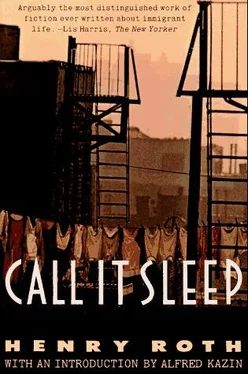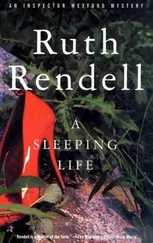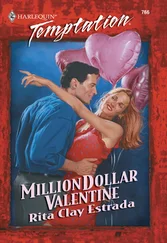“Waltuh, Waltuh, Wiuhlflowuh,
Growin’ up so high;
So we are all young ladies,
An’ we are ready to die.”
Again and again, they repeated their burden. Their words obscure at first, emerged at last, gathered meaning. The song troubled David strangely. Walter Wildflower was a little boy. David knew him. He lived in Europe, far away, where David’s mother said he was born. He had seen him standing on a hill, far away. Filled with a warm, nostalgic mournfulness, he shut his eyes. Fragments of forgotten rivers floated under the lids, dusty roads, fathomless curve of trees, a branch in a window under flawless light. A world somewhere, somewhere else.
“Waltuh, Waltuh, Wiuhlflowuh,
Growin’ up so high,”
His body relaxed, yielding to the rhythm of the song and to the golden June sunlight. He seemed to rise and fall on waves somewhere without him. Within him a voice spoke with no words but with the shift of slow flame.…
“So we are all young ladies,
An’ we are ready to die.”
From the limp, uncurling fingers, the cog rolled to the ground, rang like a coin, fell over on its side. The sudden sound moored him again, fixed him to the quiet, suburban street, the curbstone. The inarticulate flame that had pulsed within him, wavered and went out. He sighed, bent over and picked up the wheel.
When would the whistle blow he wondered. It took long to-day.…
II
AS FAR back as he could remember, this was the first time that he had ever gone anywhere alone with his father, and already he felt desolated, stirred with dismal forebodings, longing desperately for his mother. His father was so silent and so remote that he felt as though he were alone even at his side. What if his father should abandon him, leave him in some lonely street. The thought sent shudders of horror through his body. No! No! He couldn’t do that!
At last they reached the trolley lines. The sight of people cheered him again, dispelling his fear for a while. They boarded a car, rode what seemed to him a long time and then got off in a crowded street under an elevated. Nervously gripping David’s arm, his father guided him across the street. They stopped before the stretched iron wicket of a closed theatre. Colored billboards on either side of them, the odor of stale perfume behind. People hurrying, trains roaring. David gazed about him frightened. To the right of the theatre, in the window of an ice cream parlor, gaudy, colored popcorn danced and drifted, blown by a fan. He looked up apprehensively at his father. He was pale, grim. The fine veins in his nose stood out like a pink cobweb.
“Do you see that door?” Hé shook him into attention. “In the grey house. See? That man just came out of there.”
“Yes, Papa.”
“Now you go in there and go up the stairs and you’ll see another door. Go right in. And to the first man you see inside, say this: I’m Albert Schearl’s son. He wants you to give me the clothes in his locker and the money that’s coming to him. Do you understand? When they’ve given it to you bring it down here. I’ll be waiting for you. Now what will you say?” he demanded abruptly.
David began to repeat his instructions in Yiddish.
“Say it in English, you fool!”
He rendered them in English. And when he had satisfied his father that he knew them, he was sent in.
“And don’t tell them I’m out here,” he was warned as he left. “Remember you came alone!”
Full of misgivings, unnerved at the ordeal of facing strangers alone, strangers of whom his own father seemed apprehensive, he entered the hallway, climbed the stairs. One flight up, he pushed open the door and entered a small room, an office. From somewhere back of this office, machinery clanked and rattled. A bald-headed man smoking a cigar looked up as he came in.
“Well, my boy,” he asked smiling, “what do you want?”
For a moment all of his instructions flew out of his head. “My — my fodder sent me hea.” He faltered.
“Your father? Who’s he?”
“I–I’m Albert Schearl’s son,” he blurted out. “He sent me I shuh ged his clo’s f’om de locker an’ his money you owing him.”
“Oh, you’re Albert Schearl’s son,” said the man, his expression changing. “And he wants his money, eh?” He nodded with the short vibrating motion of a bell. “You’ve got some father, my boy. You can tell him that for me. I didn’t get a chance. He’s crazy. Anybody who— What does he do at home?”
David shook his head guiltily, “Nuttin.”
“No?” he chuckled. “Nothin’, hey? Well—” he broke off and went over to a small arched window in the rear. “Joe!” he called. “Oh Joe! Come here a minute, will you?”
In a few seconds a grey-haired man in overalls came in.
“Call me, Mr. Lobe?”
“Yea, will you get Schearl’s things out of his locker and wrap ’em up for me. His kid’s here.”
The other man’s face broke into a wide, brown-toothed grin. “Is zat his kid?” As if to keep from laughing his tongue worried the quid of tobacco in his cheek.
“Yea.”
“He don’ look crazy.” He burst into a laugh.
“No.” Mr. Lobe subdued him with a wave of the hand. “He’s a nice kid.”
“Your ol’ man near brained me wid a hammer,” said the man addressing David. “Don’ know wot happened, nobody said nuttin.” He grinned. “Never saw such a guy, Mr. Lobe. Holy Jesus, he looked like he wuz boinin’ up. Didja see de rail he twisted wid his hands? Maybe I oughta to give it to ’im fer a souvenir?”
Mr. Lobe grinned. “Let the kid alone,” he said quietly. “Get his stuff.”
“O.K.” Still chuckling, the grey-haired man went out.
“Sit down, my boy,” said Mr. Lobe, pointing to a seat. “We’ll have your father’s things here in a few minutes.”
David sat down. In a few minutes, a girl, bearing a paper in her hand, came into the office.
“Say, Marge,” said Mr. Lobe, “find out what Schearl gets, will you.”
“Yes, Mr. Lobe.” She regarded David, “What’s that, his boy?”
“Mmm.”
“Looks like him, don’t he?”
“Maybe.”
“I’d have him arrested,” said the girl opening up a large-ledger.
“What good would that do?”
“I don’t know, it might put some sense into his head.”
Mr. Lobe shrugged. “I’m only too glad he didn’t kill anybody.”
“He ought to be in a padded cell,” said the girl scribbling something on a paper.
Mr. Lobe made no response.
“He gets six sixty-two.” She put down her pencil. “Shall I get it?”
“Mmm.”
The girl went over to a large black safe in a corner, drew out a box, and when she had counted out some money, put it into a small envelope and gave it to Mr. Lobe.
“Come here,” he said to David. “What’s your name?”
“David.”
“David and Goliath,” he smiled. “Well, David, have you got a good deep pocket? Let’s see.” He picked up the tails of David’s jacket. “There, that’s the one I want.” And fingering the small watch-pocket at the waist. “We’ll put it in there.” He folded the envelope and wedged it in. “Now don’t take it out. Don’t tell anybody you’ve got it till you get home, understand? The idea, sending a kid his age on an errand like this.”
David, staring ahead of him, under Mr. Lobe’s arm, was aware of two faces, peering in at the little window in the back. The eyes of both were fastened on him, regarding him with a curious and amused scrutiny of men beholding for the first time some astonishing freak. They both grinned when the girl, happening to turn in their direction, saw them; one of the men winked and cranked his temple with his hand. As Mr. Lobe turned, both disappeared. A moment later, the grey-haired man returned with a paper-wrapped bundle.
Читать дальше












